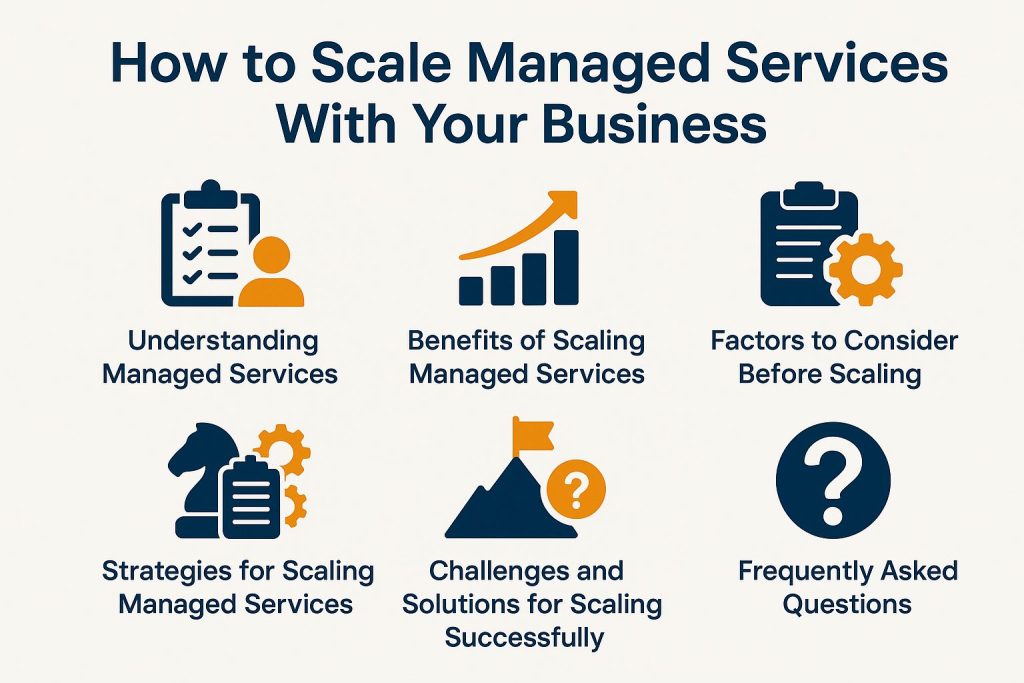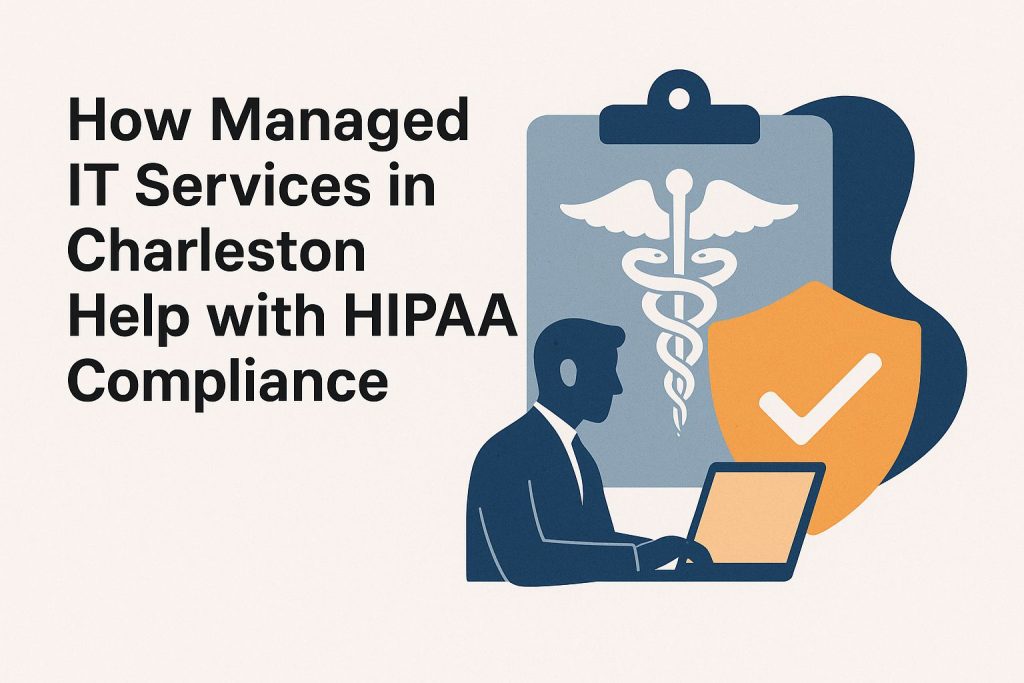Signs Your Business Needs Managed IT Services Now
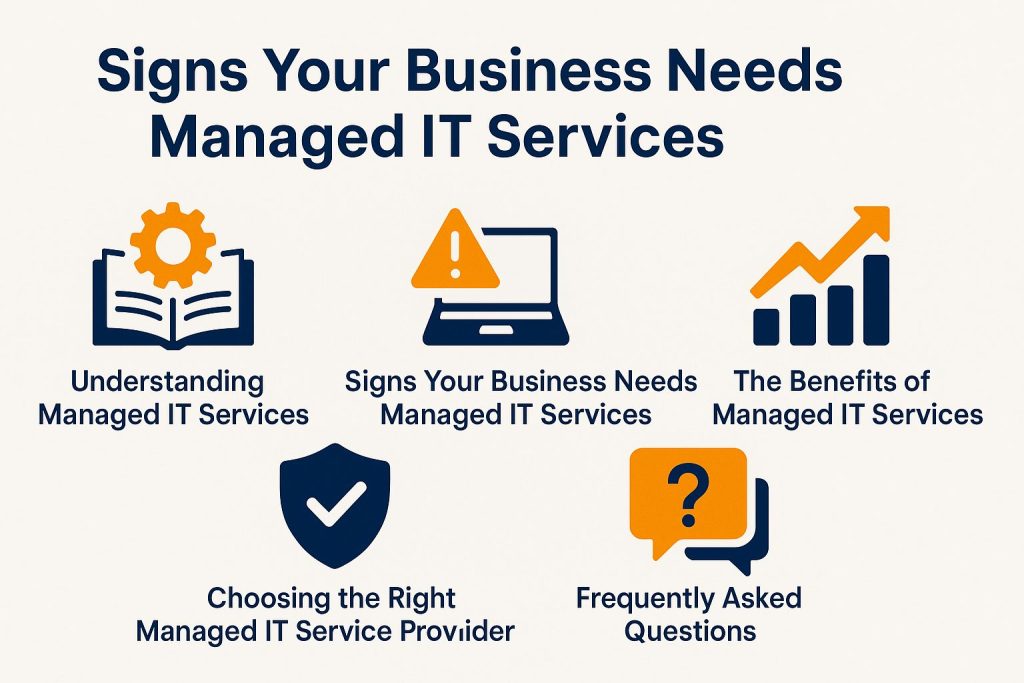
Managing IT infrastructure challenges all businesses today. This article explains managed IT services. It describes what they are and how they work. It identifies key signs indicating a business needs these services and the benefits they provide. Furthermore, the article also gives tips on how to choose the right provider. Whether a business aims to enhance efficiency or reduce costs, understanding managed IT services is essential for achieving success.
Understanding Managed IT Services
Managed IT services encompass a comprehensive range of solutions aimed at enhancing business growth, optimizing IT infrastructure, and ensuring robust cybersecurity measures are effectively implemented.
This approach helps organizations leverage technical expertise and strategic IT planning for various IT needs. These include help desk support, data management, and compliance, while ensuring network security and efficient IT maintenance.
Ultimately, managed IT services help businesses focus on their goals. They also help align technology investments with current trends.
By outsourcing IT support to a managed services provider (MSP), companies experience improved operational efficiency and seamless business continuity. This results in a notable return on investment, as highlighted in our analysis on the ROI of managed IT services for businesses.
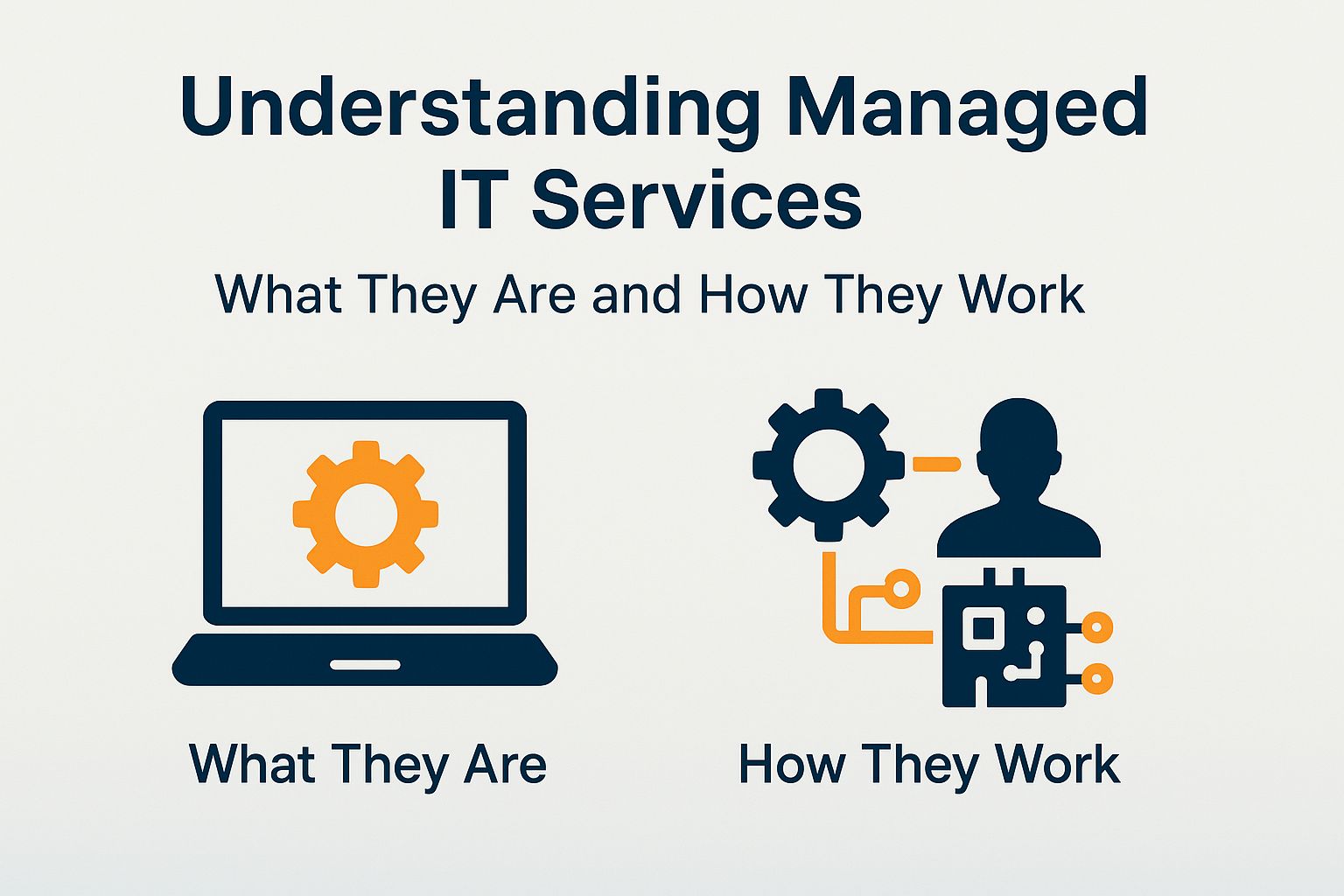
What They Are and How They Work
Managed IT services refer to the practice of outsourcing a company’s IT operations to a specialized service provider that offers ongoing support and technical expertise, thereby ensuring efficient service delivery. This model includes proactive IT management, incident response, and troubleshooting services that fit a business’s needs.
By utilizing managed IT services, companies can allocate resources more effectively and reduce system downtime.
These services establish a structured framework that enables businesses to concentrate on their core activities while entrusting the complexities of IT management to professionals. A dedicated team monitors systems 24/7. This helps organizations respond to incidents quickly, reducing disruptions and improving productivity.
Troubleshooting processes are streamlined as service providers implement preventative measures to address potential issues before they escalate. This structured approach to IT operations not only optimizes performance but also delivers strategic insights and support, aligning technology investments with business objectives to ensure robust growth and operational resilience.
Signs Your Business Needs Managed IT Services
It is important to recognize signs that show a business may need managed IT services. This helps maintain good performance and productivity, particularly when faced with operational risks and productivity bottlenecks.
Common signs that indicate the need include:
- Ongoing network issues
- Frequent system downtime
- A discernible decline in employee productivity
Furthermore, budget constraints and difficulties in ensuring compliance with regulations may signal the necessity for an IT partner who can deliver comprehensive support and proactive solutions tailored to the organization’s specific needs. If interested, businesses experiencing these challenges can find tailored solutions through small business IT support and technology management.
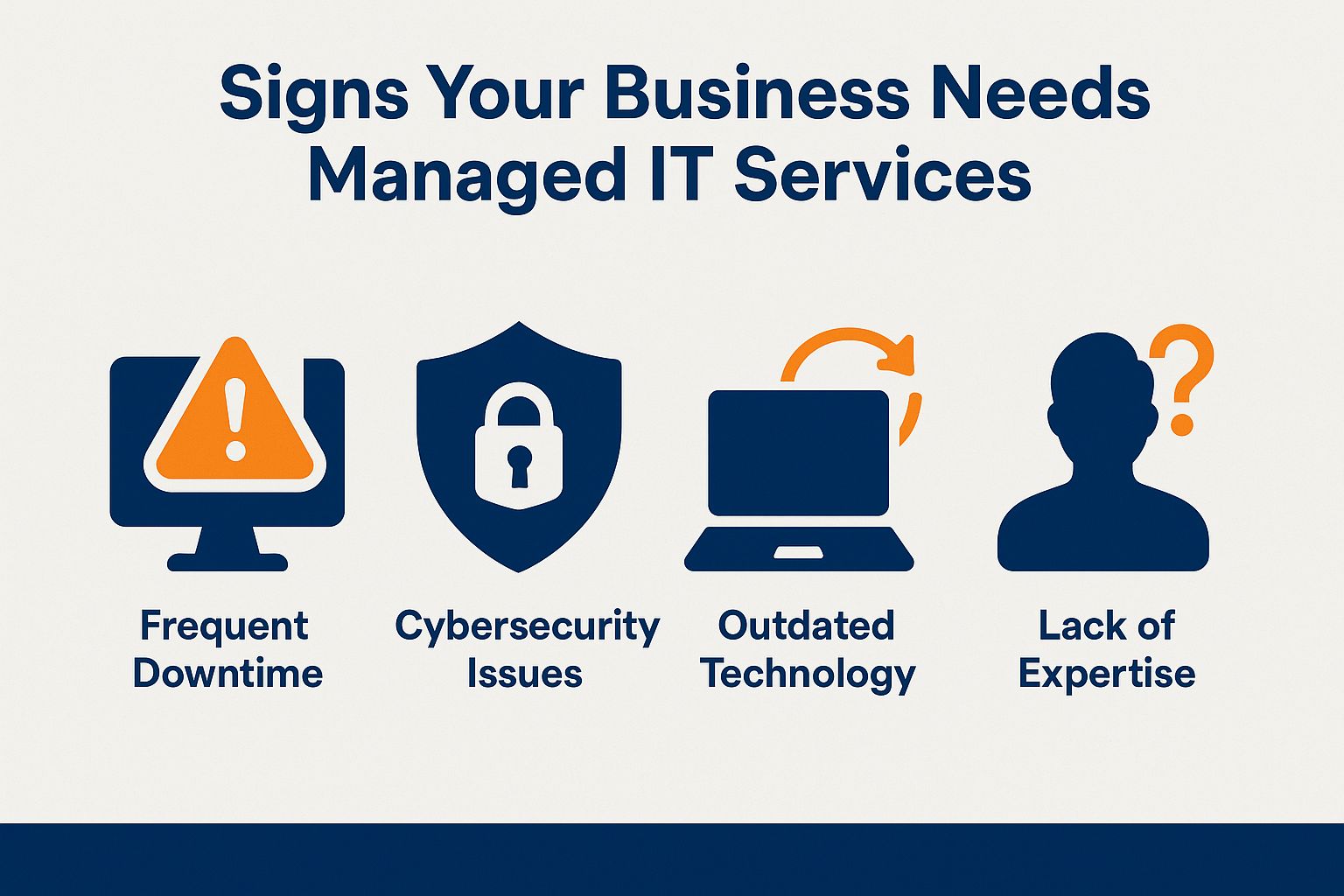
Common Indicators and Their Impact on Your Business
Common signs that a business needs managed IT services include declining performance and unmet objectives. For example, consistent reports from users regarding poor experiences due to slow system performance or increasing concerns related to risk management and data security clearly indicate that external IT support could enhance operational capabilities.
A noticeable lag in system updates and a rise in unplanned downtime can further exacerbate these challenges, resulting in decreased productivity and potential revenue loss. Additionally, if there are more security breaches or compliance issues, this shows a need for specialized help.
Managed IT services streamline processes. They implement proactive monitoring. This keeps performance optimal and maximizes user experience.
The Benefits of Managed IT Services
Managed IT services provide many benefits. These include cost savings, increased efficiency, and improved productivity.
Using a managed services provider helps organizations optimize IT operations. This lowers infrastructure costs and supports smart technology investments for growth.
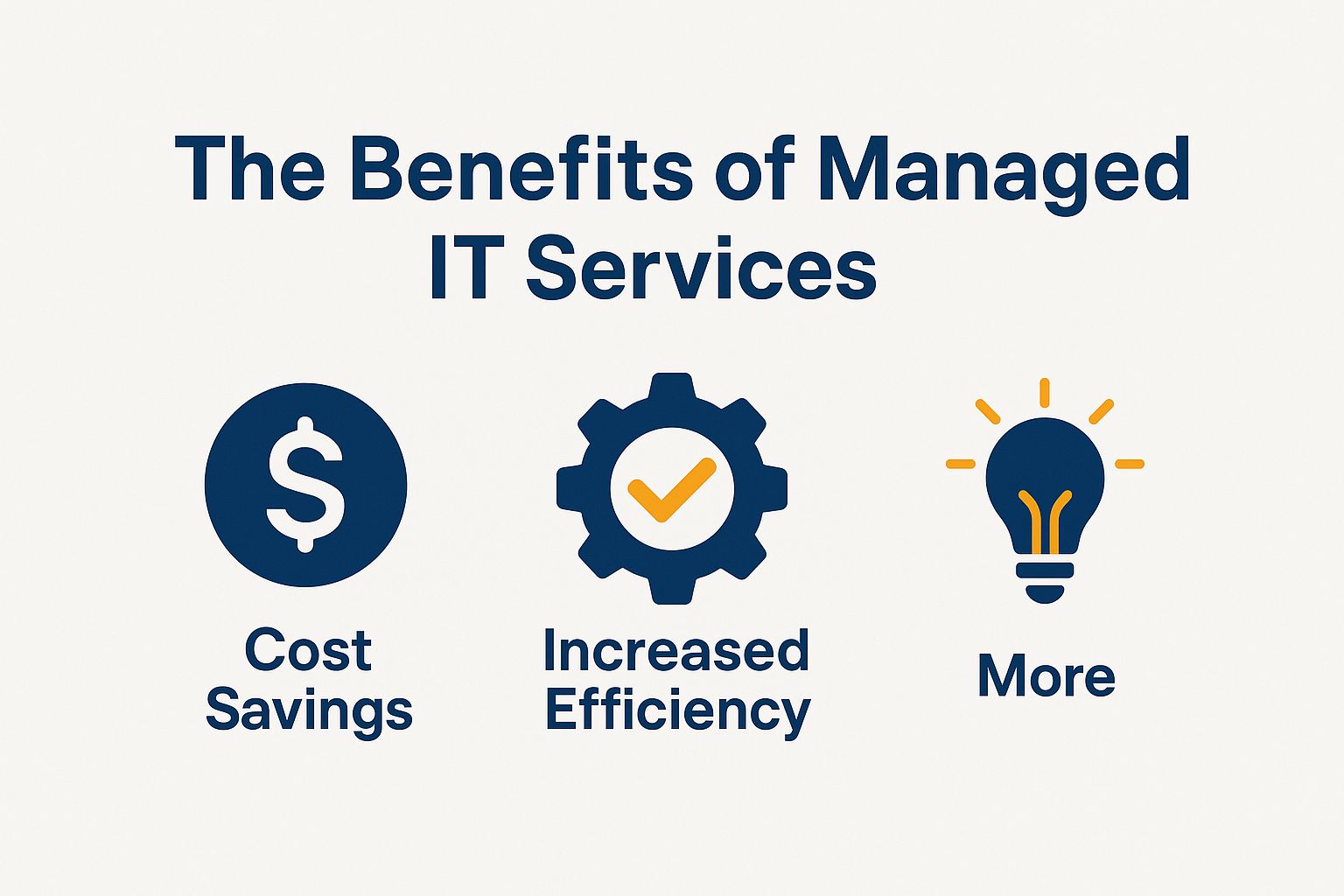
Cost Savings, Increased Efficiency, and More
A key advantage of managed IT services is cost efficiency. This allows businesses to allocate funds more strategically across various initiatives. By reducing the need for in-house IT staffing, organizations can explore cloud solutions and other optimizations that enhance operational efficiency and improve overall performance metrics.
Outsourcing IT management can lead to a significant decrease in operational costs, as it eliminates the overhead associated with maintaining a full-time staff and investing in expensive equipment. By focusing on cloud solutions, companies can take advantage of scalable resources, ensuring they pay only for what they use while benefiting from advanced security measures managed by experts.
Optimizing performance streamlines processes and reduces downtime. This contributes to increased productivity. As businesses leverage these managed services, they discover a greater capacity for innovation, give the power toing them to invest in growth and transformative technologies that may have previously been out of reach.
Choosing the Right Managed IT Service Provider
Choosing the right managed IT service provider is crucial. It influences operational efficiency and long-term success.
Consider key factors like the provider’s technical expertise, service level agreements (SLAs), and their ability to offer customized IT consulting and vendor management services. For a deeper understanding of how these services impact your business, our analysis on the ROI of managed IT services for Charleston businesses can provide valuable insights.
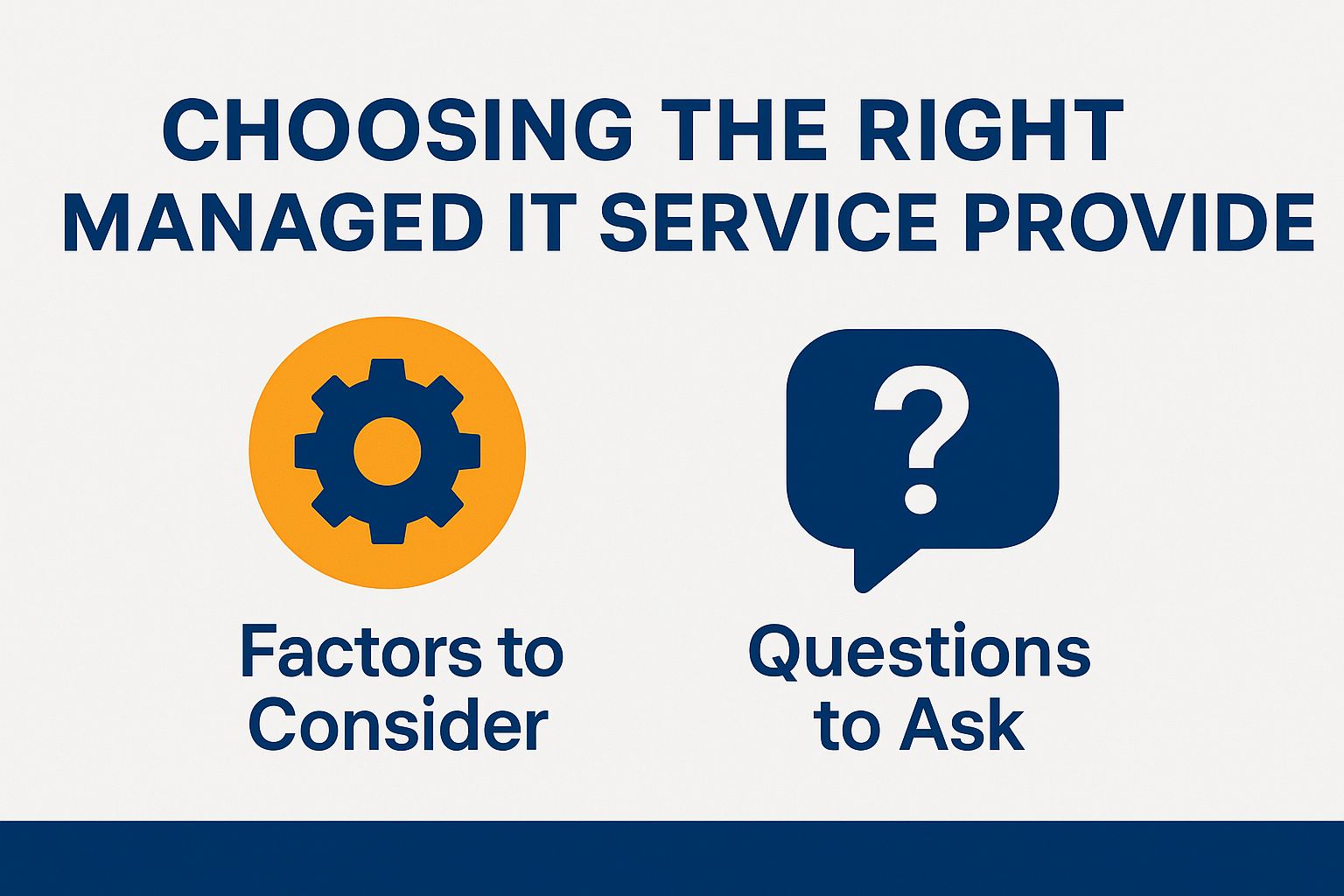
Factors to Consider and Questions to Ask
When evaluating managed IT service providers, businesses should consider several factors. These include clarity of service level agreements, compliance with regulations, and track record in risk management and user support. These inquiries provide insights into how well the provider meets operational and strategic needs.
These inquiries can provide valuable insights into how well the provider aligns with both operational requirements and strategic objectives. For example, understanding how a prospective partner manages and mitigates risks is paramount, as it directly influences the organization’s stability and security posture.
Moreover, inquiring about their compliance expertise is essential; maintaining regulatory standards can prevent costly penalties and foster customer trust. Additionally, evaluating the level of user support offered by the provider is crucial, as it can significantly enhance user satisfaction and productivity within teams. This makes it essential to explore their response times and support frameworks thoroughly.
Frequently Asked Questions
What are some signs that my business needs managed IT services now?
Some signs that your business may need managed IT services include frequent technical issues, outdated technology, and a lack of IT expertise within your team.
How do managed IT services benefit my business?
Managed IT services benefit your business by providing proactive support, increased security, and cost savings from outsourcing IT tasks.
What types of technical issues can managed IT services help with?
Managed IT services can help with a variety of technical issues, such as network outages, data loss, software malfunctions, hardware failures, and continuous improvement in system vulnerabilities.
Do I need a dedicated IT team if I use managed IT services?
No, managed IT services can serve as your IT team. They will handle technical tasks and troubleshoot issues for your business.
When should I switch to managed IT services?
You should switch to managed IT services when you face technical issues, security gaps, or need better technology.
Can I customize managed IT services for my business?
Yes, managed IT services can be customized for your needs and budget. This provides a tailored and scalable IT solution.
